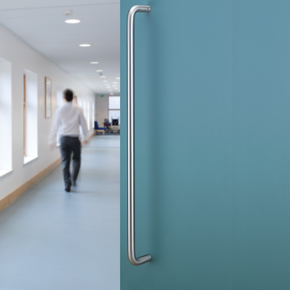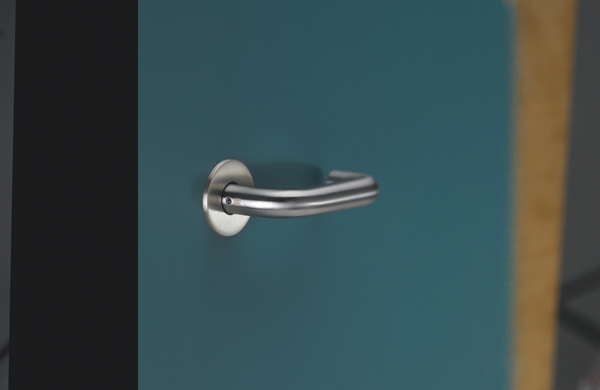
The clean appeal of copper alloys
In the September issue of ABC+D Magazine, Richard van den Bos, product manager at Allgood, discusses how implementing antimicrobial copper touch surfaces can help create a safer, more hygienic and cost-effective working and care environment in medical facilities…
Healthcare associated infections are a serious issue with 300,000 patients a year in England acquiring an infection while in the care of the NHS. Inadvertently, buildings within a medical setting can sometimes act as a petri dish for microbes that can rapidly multiply and spread – putting staff and patients at risk while stretching already scant resources in the process.
Speaking about this alarming rate of contagion, Professor Gillian Leng of the National Institute for Health and Care Excellence (NICE) said: “It is unacceptable that infection rates are still so high. Infections are a costly and avoidable burden.”
In order to counteract the threat of healthcare associated infections, hospitals and other medical facilities put in place stringent policies and practices designed to mitigate this risk. Good hand hygiene, regular cleaning and disinfection and the promotion of general sanitation practices are effective measures in reducing infections. However, these procedures will not fully eliminate the threat of healthcare associated infections.
With infection prevention so high on the agenda, prominent voices from within the medical profession are calling for procedural change and greater measures to control and reduce infection rates. Tom Sandford, director of the Royal College of Nursing in England, said: “Infection prevention and control is key to patient safety and needs to be the priority of every health service organisation.”
Copper alloys
Consequently, in an effort to eradicate health associated infections, many medical facilities are specifying copper high-touch ironmongery items such as doorsets, cabinet and pull handles, WC turns, indicators and releases as well as push plates within their buildings.
The use of copper dates back over 10,000 years and was first recognised by the ancient Egyptians for its health benefits. Copper chests would be used to store copper alloy medical instruments, which were used to perform operations.
Copper is a powerful antimicrobial with rapid, broad-spectrum efficacy against bacteria and viruses and has been shown to kill disease-causing pathogens, including MRSA, Influenza A and norovirus.
It shares this benefit with a range of copper alloys collectively called antimicrobial copper. Laboratory research on the efficacy of antimicrobial copper has been carried out and verified at institutions around the world, including the UK. Testing has been conducted under typical indoor conditions, with results peer-reviewed and published.
Clinical trials have further tested antimicrobial copper in actual use conditions. These have taken place in many healthcare systems around the world, providing a variety of trial protocols and ward types. Results show that microbial contamination is consistently reduced by more than 80% on copper compared to standard surfaces. Furthermore, an associated 58% reduction in infections has been reported in ICU trials in the US where copper touch surfaces have been used.
Conventional materials such as stainless steel have no antimicrobial qualities. Despite this, many hospitals and medical facilities specify items such as doorsets and push plates based purely on design and aesthetic appeal.
This could be attributed to the fact that pure copper’s reddish-orange appearance does not always align with the aesthetics of modern medical interiors and stainless steel may give the (false) appearance of a more sterile environment.

Antimicrobial qualities
To overcome this dilemma, some forward thinking manufacturers and suppliers are now offering copper alloy products, specifically for a medical setting, that appear almost identical to stainless steel while benefiting from the antimicrobial qualities of copper.
Although the initial financial investment of specifying copper products is usually higher than that of stainless steel alternatives, they offer long-term cost and health benefits. A study conducted by York Health Economics Consortium concluded that replacing six key touch surfaces in a 20-bed Intensive Care Unit (ICU) with antimicrobial copper would recoup the cost in less than two months, in terms of reduced infections and their associated costs.
In order to recognise copper alloy products of the highest quality and antimicrobial effectiveness, specifiers should check that they are manufactured from approved copper alloys in accordance with the International Copper Association’s industry stewardship scheme. They must also bear the Antimicrobial Copper brand’s Cu+ mark.
The spread of healthcare associated infections is a real and constant threat to hospitals and medical facilities, placing patients and staff at risk, significantly straining resources and, ultimately, leading to lower levels of welfare, efficiency and higher costs.
Specifying antimicrobial copper fixtures, fittings and other touch surfaces can help reduce the risk posed by pathogens in the environment and, thus, the risk of acquiring an infection, creating a healthier, more efficient and effective environment for both staff and patients.
Latest news

25th April 2025
Quicker and Easier Inspections with High Performance FLIR Testing Solutions
FLIR, a Teledyne Technologies company, introduces its PV range of inspection solutions to expedite panel installation and maintenance at solar farms, commercial buildings, and residential buildings.
Posted in Articles, Building Industry News, Building Products & Structures, Building Services, Facility Management & Building Services, Information Technology, Innovations & New Products, Research & Materials Testing, Restoration & Refurbishment, Retrofit & Renovation, Sustainability & Energy Efficiency, Thermal Imaging and Monitors
25th April 2025
Schlüter-Systems: Common costly mistakes when renovating a bathroom
With nearly six decades of experience in the bathroom world, Schlüter-Systems knows all there is to know about the challenges of installing a perfect one!
Posted in Articles, Bathrooms & Toilets, Bathrooms, Bedrooms & Washrooms, Building Industry News, Building Products & Structures, Building Services, Damp & Waterproofing, Drainage, Drainage Services, Drainage, Guttering, Soffits & Fascias, Heating, Ventilation and Air Conditioning - HVAC, Interior Design & Construction, Interiors, Membranes, Pipes & Fittings, Plumbing, Restoration & Refurbishment, Retrofit & Renovation, Walls
25th April 2025
Newcastle United enhances fans’ experience with Stannah escalators
Newcastle United Football Club has introduced two new Stannah escalators as part of a refurbishment of its on-site merchandising outlet.
Posted in Accessibility, Articles, Building Industry News, Building Products & Structures, Building Services, Case Studies, Facility Management & Building Services, Restoration & Refurbishment, Retrofit & Renovation
24th April 2025
Gemini: Using Data Loggers to Help Analyse Environmental Conditions and Energy Usage in Buildings
Gemini Tinytag Data Loggers record environmental parameters over time, allowing conditions to be measured, documented, analysed, and validated.
Posted in Articles, Building Industry News, Building Products & Structures, Building Services, Facility Management & Building Services, Health & Safety, Heating Systems, Controls and Management, Heating, Ventilation and Air Conditioning - HVAC, Information Technology, Research & Materials Testing, Restoration & Refurbishment, Retrofit & Renovation, Sustainability & Energy Efficiency, Thermal Imaging and Monitors
 Sign up:
Sign up: